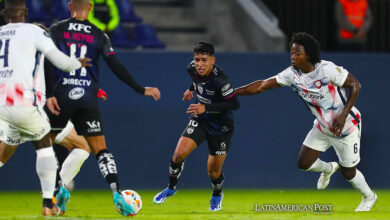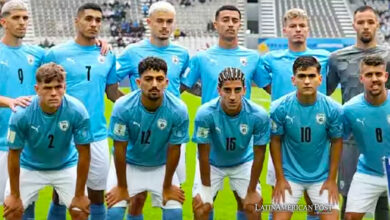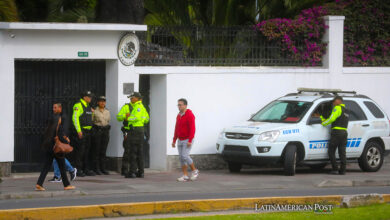FIFA Sanctions, Which Have Been The Most Severe?
The world of football continues to be shocked by the violent events recorded a few days ago in Querétaro, Mexico, in which 17 people died and another 23 were injured. While waiting for the punishments issued by the responsible bodies, we review some FIFA sanctions in the past

Photos: AFP, MT
LatinAmerican Post | Onofre Zambrano
Listen to this article
Leer en español: Sanciones de la FIFA ¿cuáles han sido las más severas?
There have been many more cases of exemplary punishment of players than of teams or selections, but the truth is that FIFA and its affiliated bodies have historically had to deal with behaviors that in some cases have triggered tragedies in football. This has forced them to put a heavy hand to prevent a recurrence. The violence that took place on March 5 at the La Corregidora Stadium in Querétaro, Mexico, is already one of the most daunting in history with a fatal balance of 17 dead and 22 seriously injured. From the outside, exemplary punishments are expected for the "Gallos Blancos" club from Querétaro, and Liga MX, since they are the entities assigned to protect the integrity of the attendees, which did not happen.
Through a short statement, he expressed “FIFA is dismayed. Acts of violence are unacceptable and intolerable. We join the Mexican Football Federation and Concacaf in condemning this despicable incident and encourage the authorities to bring justice to the individuals responsible. Our thoughts are with all those who suffered its consequences, "announced El Sol de México.
Footballers punished
The Chilean goalkeeper, Roberto Rojas, suffered one of the harshest sanctions in memory, and by the way, with his behavior, he dragged his national team down, even though it was not a matter of violence. It was on September 3, 1989. Brazil and Chile played at the Maracana in a qualifying match for the 1990 World Cup in Italy. The 'canarinha' partially won 1-0 and thus eliminated the Austral team. In minute 67, a flare fell on the grass and the goalkeeper collapsed, appearing to be injured with the artifice launched from the stands of the local fans. His face was bleeding, but television images later showed that the object did not hit Rojas and that he faked the attack. The goalkeeper confessed that he had caused the injuries himself with a razor blade that he had in his glove.
FIFA banned him for life for unsportsmanlike conduct. He never played professionally again, and Chile was excluded from the World Cup in Italy, as well as from the qualifiers for the United States in 1994. Another iconic case was that of Juanito, a former Real Madrid player, who suffered two penalties in his career, which kept him seven years of European competitions. The first for 24 months after assaulting the German referee Adolf Prokop and one of his line judges in a match against Grasshoppers of Switzerland in 1978. The second unsportsmanlike conduct was in the semifinals of the 1897 European Cup against Bayern Munich, in which the defender deliberately stepped on the head of the German Lothar Matthaus, who was on the ground. It was five years of suspension.
Who does not remember the flying kick off the Frenchman Eric Cantona? one of the most popular attacks in history. It happened on January 25, 1995. Cantona was a Manchester United player and like a karate fighter, he hit Matthew Simmons in the chest, a Crystal Palace fan who rebuked him when he was leaving the locker room after being expelled from the game. The English Federation sanctioned him with nine months, a 20 thousand pound fine, and two weeks of community service.
Another event happened in the 1984 Copa del Rey final between Athletic Bilbao and Barcelona at the Santiago Bernabéu, two rivals with unfinished business. The tension was increasing and could not be controlled at the end of the match. Players and fans ran across the grass of the legendary stadium with punches and kicks everywhere. Diego Maradona, Clos, Migueli, Andoni Goikoetxea, Sarabia, and De Andrés received a three-month punishment without being able to play. However, after the summer, none of the players served any sanction. Maradona signed with Napoli and the others continued playing. A curious result.
The Uruguayan Luis Suárez had to accept a nine-match ban plus four months off the pitch, 82,000 euros, and a ban on entering the stadiums. All this is due to the bite he gave to the Italian Giorgio Chiellini in the match between Uruguay against the "Azzurri" in the group stage of the 2014 World Cup in Brazil.
Also read: Latin soccer players who make life in the leagues of Russia and Ukraine
Sanctions in Heysel, great reference
On May 29, 1985, at the Heysel stadium in Brussels, in the UEFA Champions League final between Juventus and Liverpool, what is considered by many to be the greatest tragedy in history took place, when an avalanche of fans of both teams caused the death of 39 people. The report determined that it was the English fans who were responsible for being under the influence of alcohol and provoking the Italians by throwing objects at them. The fans, mostly Italians, were trapped in an area of the stadium that had no emergency exit and several died of suffocation.
The punishment was exemplary. Liverpool paid dearly for the consequences by being suspended from all European competitions for 10 years, until 1995, although the punishment was later reduced until 1991. In turn, the rest of the English clubs also had to pay with a five-year suspension from competitions from UEFA. These measures accelerated the disintegration of the Hooligans, a group of radical and violent English fanatics. Liquor was never sold in European stadiums again.
Selections, few precedents
In the most recent case, Russian clubs and national teams were banned from all FIFA and UEFA competitions until further notice due to the Russian government's military invasion of Ukraine. A situation totally unrelated to football and to which the Russian Federation has already appealed through the Court of Arbitration for Sport (TAS). In a similar order of ideas, the extinct Yugoslavian national team was separated by UEFA from the possibility of playing the 1992 European Championship in Sweden despite earning the legitimate right on the field during the qualifiers. The War in the Balkans caused it to be replaced by Denmark.




